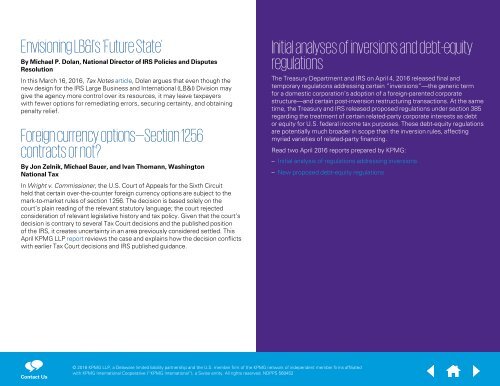Tax Dispute Resolution Quarterly
29rgRWs
29rgRWs
You also want an ePaper? Increase the reach of your titles
YUMPU automatically turns print PDFs into web optimized ePapers that Google loves.
Envisioning LB&I’s ‘Future State’<br />
By Michael P. Dolan, National Director of IRS Policies and <strong>Dispute</strong>s<br />
<strong>Resolution</strong><br />
In this March 16, 2016, <strong>Tax</strong> Notes article, Dolan argues that even though the<br />
new design for the IRS Large Business and International (LB&I) Division may<br />
give the agency more control over its resources, it may leave taxpayers<br />
with fewer options for remediating errors, securing certainty, and obtaining<br />
penalty relief.<br />
Foreign currency options—Section 1256<br />
contracts or not?<br />
By Jon Zelnik, Michael Bauer, and Ivan Thomann, Washington<br />
National <strong>Tax</strong><br />
In Wright v. Commissioner, the U.S. Court of Appeals for the Sixth Circuit<br />
held that certain over-the-counter foreign currency options are subject to the<br />
mark-to-market rules of section 1256. The decision is based solely on the<br />
court’s plain reading of the relevant statutory language; the court rejected<br />
consideration of relevant legislative history and tax policy. Given that the court’s<br />
decision is contrary to several <strong>Tax</strong> Court decisions and the published position<br />
of the IRS, it creates uncertainty in an area previously considered settled. This<br />
April KPMG LLP report reviews the case and explains how the decision conflicts<br />
with earlier <strong>Tax</strong> Court decisions and IRS published guidance.<br />
Initial analyses of inversions and debt‐equity<br />
regulations<br />
The Treasury Department and IRS on April 4, 2016 released final and<br />
temporary regulations addressing certain “inversions”—the generic term<br />
for a domestic corporation’s adoption of a foreign-parented corporate<br />
structure—and certain post-inversion restructuring transactions. At the same<br />
time, the Treasury and IRS released proposed regulations under section 385<br />
regarding the treatment of certain related-party corporate interests as debt<br />
or equity for U.S. federal income tax purposes. These debt-equity regulations<br />
are potentially much broader in scope than the inversion rules, affecting<br />
myriad varieties of related-party financing.<br />
Read two April 2016 reports prepared by KPMG:<br />
––<br />
Initial analysis of regulations addressing inversions<br />
––<br />
New proposed debt-equity regulations<br />
© 2016 KPMG LLP, a Delaware limited liability partnership and the U.S. member firm of the KPMG network of independent member firms affiliated<br />
with KPMG International Cooperative (“KPMG International”), a Swiss entity. All rights reserved. NDPPS 568452


